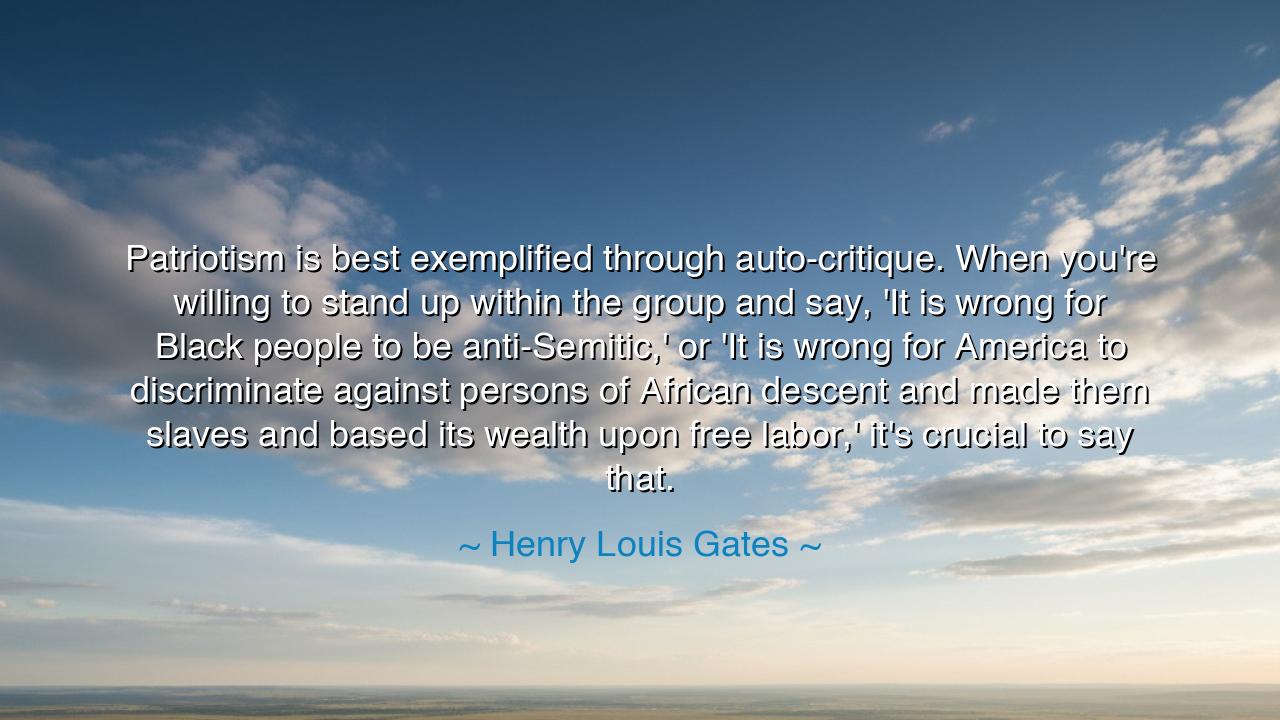
Patriotism is best exemplified through auto-critique. When
Patriotism is best exemplified through auto-critique. When you're willing to stand up within the group and say, 'It is wrong for Black people to be anti-Semitic,' or 'It is wrong for America to discriminate against persons of African descent and made them slaves and based its wealth upon free labor,' it's crucial to say that.






The words of Henry Louis Gates—“Patriotism is best exemplified through auto-critique”—resound like the voice of a sage reminding us of the higher duty of love. True loyalty to one’s nation or people is not blind adoration, but the courage to confront its faults, to name them, and to heal them. For love that does not dare to correct is no love at all, but a mask of indifference. Just as a physician, out of compassion, must reveal the sickness that festers in the body, so must the patriot, out of devotion, reveal the injustices that weaken the soul of a nation.
When Gates declares that it is righteous to say, “It is wrong for Black people to be anti-Semitic,” and also to say, “It is wrong for America to discriminate against persons of African descent and base its wealth upon free labor,” he speaks to the universal law of truth. No community is pure, no people without blemish. But the noblest spirit is that which, even at the risk of anger or exile, speaks within the circle of its own tribe, saying, “This is not the way of justice.” To rebuke one’s own people is a greater act of patriotism than to condemn an enemy, for it seeks not victory over others, but righteousness within the self.
Consider the example of Frederick Douglass, once a slave, later a great orator and statesman. In 1852, he stood before his fellow Americans on the Fourth of July and declared the day a mockery so long as millions remained in chains. Many were outraged, yet his words were not born of hatred, but of deep devotion to the ideal of liberty proclaimed in the nation’s founding. Douglass understood that critique is the highest form of loyalty—for he loved America enough to demand that she live up to her own creed. His speech, fiery and painful, was in truth an act of fierce patriotism, for it sought to bind the nation back to its own promises.
Such acts are never easy. To stand before one’s people and denounce injustice is to walk into the fire. It is to risk being cast aside as traitor, when in truth one is the truest friend. Yet this path is the only path to renewal. Without self-examination, without the humility to confront wrongs, communities rot from within. Nations that cannot endure critique collapse beneath the weight of their own hypocrisy. But nations that dare to listen to their prophets, who love enough to rebuke, are nations that endure through centuries.
Auto-critique is not destruction—it is pruning. The gardener does not hate the tree when he cuts away its diseased branches; he saves it. The surgeon does not despise the body when she removes the infection; she preserves it. So too, the patriot who raises their voice against injustice does not despise their people—they guard them from ruin. True patriotism is the fire that purifies, not the silence that suffocates.
The lesson for us, children of later ages, is this: Do not confuse loyalty with silence. Do not mistake unity for untruth. If you love your family, your community, your nation, then dare to speak with courage when they falter. To remain quiet in the face of wrong is to abandon them to decay. But to speak with honesty, though it wounds, is to give them the chance to heal. Silence is easy; love with courage is divine.
In your daily life, you can practice this sacred teaching. If you see prejudice in your circle of friends, speak against it. If you witness cruelty in your community, name it. If your nation strays from its ideals, hold it accountable. Do so not with hatred, but with love fierce enough to demand better. This is how one becomes a guardian of truth and a servant of justice.
Therefore, remember Gates’ teaching: Patriotism is not blind praise, but the sacred courage of auto-critique. It is the willingness to love so greatly that you dare to correct, to wound in order to heal, to rebuke in order to redeem. This is the legacy of the prophets, the reformers, the heroes. This is the path by which nations endure, and the only path by which we, too, may grow into people of honor.






AAdministratorAdministrator
Welcome, honored guests. Please leave a comment, we will respond soon